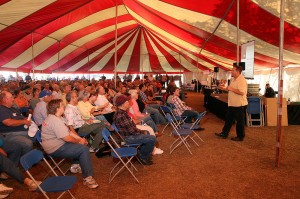 You know those who play Jazz music know of a concept of “standards.” These are the basic songs that you must know if you are to be an acceptable musician. They consist of old tried and true songs that have been passed down from generation to generation of musicians. Musicians don’t have to play it in exactly the same way, but they must know the “tunes” and be able to play them when called upon.
You know those who play Jazz music know of a concept of “standards.” These are the basic songs that you must know if you are to be an acceptable musician. They consist of old tried and true songs that have been passed down from generation to generation of musicians. Musicians don’t have to play it in exactly the same way, but they must know the “tunes” and be able to play them when called upon.
The last few months, I have been looking at some old sermon material that my father has showed me. Specifically they are the very old book Public Evangelism by J. L. Shuler published in 1939. In addition there is the book Evangelistic Methods: Step by Step by Fordyce Datamore published in 1957. And then there is God Made An Evangelist by E. E. Cleveland published in 1994.
These books primarily are “Evangelistic” sermons and methods for doing evangelism. Many of the principles are still being used, although modified, by evangelists today. There are a lot of things of interest in these materials to me, a seminary trained homilititian, and we will discuss these over time on the website.
Basic Sermons Passed Down
But one thing that was striking is the consistency of the sermons in the books. There were a number of basic sermons that seemed to be passed down from generation to generation of Adventist Evangelist. There were a few new sermons or different sermons, but in general they were the same sermons with only a change in sermon title and/or illustrations. Shuler even suggests that the great Adventist Evangelist should be always on the lookout to have modern and appropriate titles to “speak on the old-time truths of the message.”
Shuler’s Daniel 2 sermon was titled The Fate of Europe. This became simply titled “Daniel 2” by Datamore. Finally Cleveland gave it “The Great Prophetic Metal Man. Does He Live Today?” Shuler added other possible titles as “Seven Words That Changed History.” Those words were “They shall not cleave one to another.” And so on with other sermons like the Second Coming, Millennium, and State of the Dead.
Of particular interest was the Sabbath. Here evangelists would use titles like “What Day Should Christian’s Keep” and “The Missing Text” which goes through all the texts that refer to Sunday in the Bible. These sermons took on titles like Mary’s Mother’s Birthday and “The Father Didn’t, The Son Wouldn’t, The Apostles Couldn’t. Who Did.”
What is interesting though is that while the titles changed, the basic idea behind each of these sermon/lectures was a number of texts that would be presented to prove the validity of the claims of the Evangelist. These basic sermons were the “standards” or the “Adventist Basics” of the Adventist Evangelist. (note: Instead of using the term “standards” which has a specific meaning among Adventists, I will use the term “Adventist Basics” for understanding.)
Listen Over And Over Again
Daniel 2 had to be preached under whatever title. Daniel 7 had to be preached as well. The history of the papacy had to be preached. Revelation 12, 13, and 14 as well. These were the “Adventist Basics.”
And just like a jazz audience who have heard the standards over and over again, they never tire of hearing them. So the Adventist audience who have heard Daniel 2 wonder how the preacher will present it this time.
But the “standards” or “Adventist Basics” did not just include the books of Daniel and Revelation. In the 16 week meeting the preacher had to preach why the preacher accepts the Bible as the Word of God. There were also sermons on Family life like Cleveland’s “Marriage-The Secret to a Happy Home Life.” In addition, all of them had sermons on “confession, repentance, and forgiveness.”
Building The Framework of Adventism
These basic building block sermons were a solid part of the preaching in tents. They gave a solid foundational understanding of the framework of Adventism. However, in today’s world, 16 weeks 6 nights a week will not work. There are just too many nights. That meeting has been truncated to 5 weeks 4 nights a week. And thus many sermons had to be removed. Some of them were the standards. And thus now we are in an interesting position where these sermons that everyone had heard. Whether they agreed with the position or not, they at least have heard them. Now we have generations of Adventists who don’t know the “Adventist Basics.” They don’t know the basic Adventist argumentation. Now these “Adventist Basics” are hidden away in theological texts. Books like “1844 Made Simple” is simply an expansion of a Bible study that every Adventist had heard in the evangelistic meetings. It was an “Adventist Preaching Standard.”
I do not think that we can simply go back to the past. Neither do I think that we can or should attempt a 16 week, 6 night a week meeting in 2010, but we have to find a replacement for that meeting that will pass on the “Adventist Basics” to another generation.
 This union of churches idea is interesting to me. It appears as though it simply eliminates the conference level and with it a lot of expense. There definitely seems to be an upside with what looks like a lot of cost savings.
This union of churches idea is interesting to me. It appears as though it simply eliminates the conference level and with it a lot of expense. There definitely seems to be an upside with what looks like a lot of cost savings.




